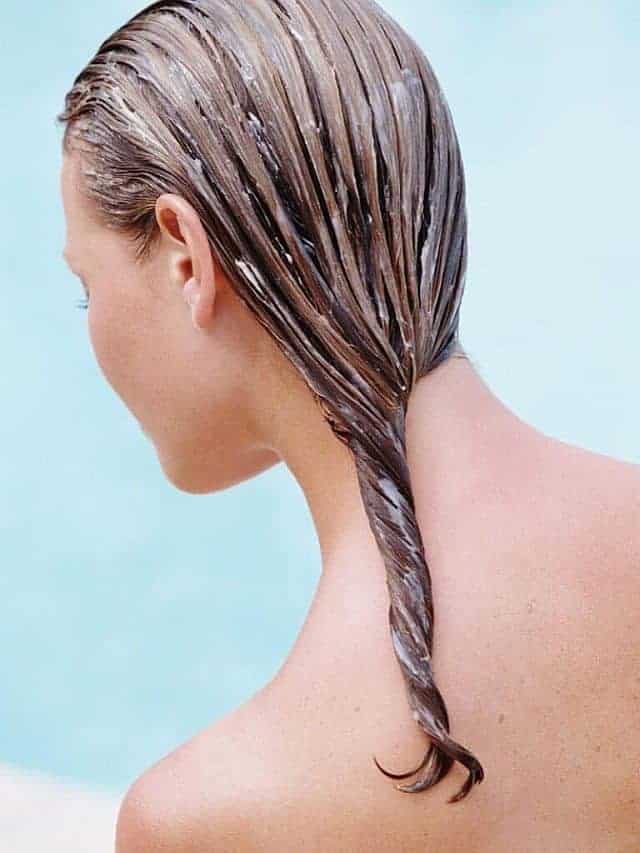Last Updated on December 31, 2022 by Gaga
Hair breakage occurs when the hair strands break along the shaft or snap due to weak points in the hair structure. Damaged hair has lost its protective outer layer and has an increased tendency to break during everyday wear and tear.
Virgin hair can undergo stretching of up to 30% of its initial length and it contracts back to the normal length and will recover very well. However, excessive stretching could be harmful to the hair. Stretching the hair fibers to 70% can cause irreversible damage to the hair shaft. Stretching hair to 80% of the original fiber length will cause breakage.

Curly hair lacks natural oils that give elasticity to hair fibers. This type of hair is more prone to breakage than straight hair. The curly strands create friction during brushing and styling which can damage the cuticle, increasing the chances of breakage.
Straight hair is easier to brush since combing friction is low and there is no risk of severe damage when hair is brushed.

What Causes Hair Breakage?
Common hair care habits that can trigger hair breakage are frequent shampooing, excessive heat styling, and chemical hair treatments such as chemical straightening, perms, and permanent hair coloring.
1. Chemical Treatments
Studies show the number of broken hair fibers increases with the frequency of chemical treatments. Chemical processing such as straightening, permanent waving, bleaching, and coloring can compromise the integrity of the cuticle layer, contributing to frizzing, tangling, and split ends.
Chemical straightening and perming involve changes in disulfide bonds within the hair fibers, leaving the strands with decreased tensile strength and increased brittleness. Permanent hair dyes affect the chemical bonds in the hair cortex and disturb the cuticle layer, leaving the strands weak, inelastic, and vulnerable to breakage.
Hair breakage often occurs when chemical treatments and products are over-used or applied incorrectly. When chemicals are left on longer than the recommended length of time or are not properly rinsed out hair strands can become excessively dry and fragile.
2. Heat Styling
Blow drying and flat ironing using extremely high temperatures can cause hair to become brittle and weak. The heat sucks moisture from the strands and affects the integrity of the hair fiber, leaving hair dry and prone to breakage.
3. Tight Hairstyles
Pulling hair into a tight bun, ponytail, or braid regularly can create excessive tension and increase the likelihood of breakage. You should also refrain from using uncovered rubber bands and sharp hair accessories that pinch or pull your hair and cause knotting, increasing the risk of breakage.
4. Vigorous Brushing and Combing
Excessive combing, as well as brushing hair when wet, can increase friction and cause mechanical damage to the cuticle, leading to weakened hair fibers. Another factor that often contributes to hair breakage is the hair’s tendency to get tangled. Pulling through the tangle creates overstretching and bending that can cause hair fibers to break.
5. Chemicals in Hair Care Products
The frequent use of poor-quality shampoos and styling products that contain alcohol can leave your locks dry and ready to snap. The chemicals from hair care products can build up on the hair over time, making it more susceptible to breakage when brushed.
Other Causes of Hair Breakage
Nutritional deficiency, aging, hormonal imbalances, and certain medical conditions are often contributors to hair breakage. Environmental factors such as hard water and continual exposure to sunlight can also weaken hair and exacerbate breakage.
Related Article

How to Stop Hair Breakage?
Hair doesn’t have a self-repairing capability, so broken hair fibers cannot be restored. However, you can prevent hair breakage and split ends by adjusting your hair care routine. Hair breakage can be significantly reduced by restricting the use of chemicals and heat styling tools and selecting appropriate hair care products.
1. Keep Your Locks Moisturized
Since dry hair breaks easily, it is important to keep your locks well-moisturized. Moisture provides the disulfide bonds in the hair cortex with the flexibility to retract to a normal state after stretching.
Avoid daily shampooing because too frequent washing can remove the protective oil coating from the strands, leaving your hair overly dry and less elastic. Look for a sulfate-free shampoo that will provide gentle cleansing without stripping off natural oils from your hair and scalp.
Apply a good moisturizing conditioner after shampooing to reduce friction and replenish the lost moisture.
Treat your hair with a deep conditioner once a week to help it stay hydrated and smooth down split ends.

2. Untangle Gently
To limit physical stress on the hair, do not brush your hair roughly. Use your fingers and a wide-toothed comb to gently untangle your locks. To minimize the risk of breakage, start from the tips, and then gradually work to the roots.
For best results, use a wide-toothed sandalwood comb, since it doesn’t tend to pull or break the hair while weaving its way through the follicles without getting stuck. Thus, detangling becomes much easier as compared to plastic combs. The wide bristles reduce friction, so getting rid of tangles and knots is more convenient. The perturbing issue of hair loss while combing is taken care of, which means less breakage and damage. If you have a sensitive scalp, a sandalwood comb prevents any kind of bruising or scraping, while ensuring your hair doesn’t dry out, by distributing oil from scalp to hair.

3. Avoid Overstretching
To avoid overstretching the strands, do not tie your hair very tightly. Choose elastics, headbands, and hair clips made of smooth and hair-friendly materials that will not cause knotting and breakage.
4. Reduce the Use of Heat Styling Tools
Give your hair a break from using heated tools. Air dry your hair if you have time, or use a blow-dryer at a lower setting and with continuous motion. If you can’t move away from hot tools, use heat protection products to minimize the damage from heat.
5. Trim your Hair Regularly
Have regular trims to get rid of damaged ends and prevent further breakage. If you do not have your hair trimmed for a long time, splits can travel up the hair shaft making the strand weak and ready to snap.
6. Minimize The Use of Chemicals
Avoid overlapping chemical treatments and keep a recommended gap between two chemical processing. Minimize the use of styling products that contain drying alcohol and other harsh chemicals. Switch to natural hair care products to keep your hair in good condition and more resistant to breakage.
7. Do Hot Oil Treatments
Natural oils like coconut, almond, and extra virgin olive oil are excellent home remedies for hair breakage. Doing a hot oil treatment once a week strengthens the strands from roots to tips and provides your hair with much-needed moisture.
8. Use Hair Straightening Masks
Try a homemade hair mask that nourishes and strengthens damaged hair. Apply a mayonnaise or avocado hair mask if you want to revitalize your strands and prevent further damage and breakage. Alternatively, purchase a keratin-infused mask to temporarily fix damaged areas in your hair and make your strands mo resistant to breakage.

Gaga is a blogger and founder of the Softer Hair website. She often says that insomnia is to blame for her first blogging attempts. Being the night owl, she hated the morning alarm. She left her office job and returned to what she loved most - writing.


It sure got my attention when you said that the frequent use of chemicals and hair treatments on your hair could make the hair prone to breakage. I would definitely tell my hairstylist to make sure that the treatment that she uses on my hair are all organic hair care products. I want my hair to be soft and shiny, but I don’t want to risk having damaged hair because of the frequent use of chemicals.